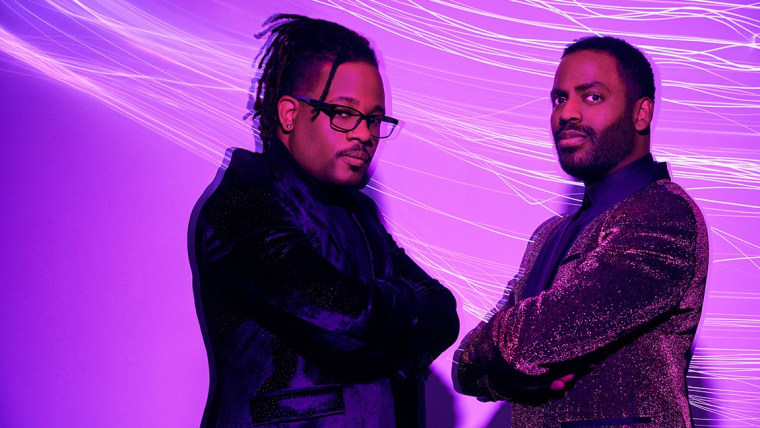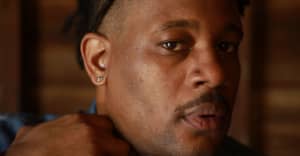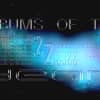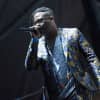 Photo: Ramona Rosales via Comedy Central
Photo: Ramona Rosales via Comedy Central
Michael Eagle is more tired than normal. He’s in a New York hotel room, which he headed to straight from the airport, which he headed to after yet another tour. The rapper who performs as Open Mike Eagle is about to start promo tour, this time for The New Negroes, his new TV show with Baron Vaughn that premiered on Comedy Central last Friday night. The show is a half-hour variety series that includes guest comics, music videos, a piercing sense of humor, and a desperate plea for mainstream networks to recognize black artistic talent.
The idea came together in 2017 when Eagle and Vaughn linked up with Funny Or Die to help produce the series. Once Comedy Central bought the show, it took about a year for the duo to go from shooting to having the show set. It’s now a supersized version of Open Mike Eagle’s vision, to blend comedy and music in a way that’s both revelatory and engaging with the history of humorous rap music. Part of that process included revising how, exactly, a new platform could work to their benefit. “We wanted to take advantage of the television format by involving different voices and draw out some of the concepts we came up with,” Eagle explains. “We did that through music videos for the musical part of the show, which we think turned out pretty great. We’re really proud of them.”
The joy and exhilaration Mike has found in birthing this project is why he’s eager to discuss George Wallace’s comedy, being a rapper with a TV show, and pushing black art. His music has always possessed a comedic edge. He’s one of the funniest, wittiest emcees of any generation, and there's also an anger towards the way black people are treated in America — a deep righteousness of conviction. His music's gotten darker as a result: his last EP, What Happens When I Try to Relax, was about being ghosted by ghosts and still living in the red, following up on 2017’s Brick Body Kids Still Daydream, a history of the now-demolished Robert Taylor Homes in Chicago and the people who lived in it.
The New Negroes is essentially Mike’s way of being silly, but it's funniest moments are often deadly serious. We talked about making the show, his experience in the industry, and his ongoing master class in comic timing.
What’s it like doing an Open Mike Eagle tour and turning around to do press for The New Negroes?
It’s been super weird. When the tour was booked, we didn’t have an air date for the show. I was just doing my music thing until we were told that the show was about to go down — not ideal. Conceptually and socially, everything that’s happening with the show is stuff I can’t connect to from the road. When I’m driving through Louisville, Kentucky, I’m not able to touch that the way I want to. I want to take it in and capture the moment. Who knows if this will ever happen again.
What was the production process like?
Comedy Central's stand-up shows tend to have a little bit of a backlog. Once it gets finished, you wait your turn. That in-between time is difficult, but it’s like having your album mastered and waiting on the label for a release date.
What's the difference between live performance and making this show?
An abdication of personal responsibility. I’m used to doing an act onstage where there are songs I’ve wrote, and depending on what night it is and what location I’m in, it might go great or awful. Shooting a television show is a lot more developed and scripted. We had a small writer’s room and a few hands-on execs that we dealt with — definitely more than I’m used to. I appreciated that a lot, because I don’t know what the hell I’m doing. I’m not even supposed to be here.
How much improvisation is there on The New Negroes?
There are moments that we run with, but it’s pretty scripted — it has to be, because there are cameras that have to know what to cut to. There’s a lot to consider and a lot of people that have to be dialed in. You can’t do it on a whim.
When did you and Baron first start collaborating?
We met at a comedy rap battle. I lost. We had a mutual respect for each other and we were on each other’s podcasts as guests. We connected pretty quickly. The first thing we officially collaborated on was my video for “Dark Comedy Late Show.” Fuse was trying to get some comedy content and we conceived of this man-on-the-street bit where this rapper would be attempting to sell people love songs on the spot, but the joke was that he'd start coming onto the woman. It was a fucking disaster but we talked Baron into doing it.
He started doing The New Negroes as a live show in Portland about five years ago, and around three years ago he got me involved with that. We have a rhythm and respect for each other’s timing. I’m the musician and he’s the very seasoned stand-up, so a lot of the time I’ll follow his lead. He’s super generous onstage and we have a good back-and-forth dynamic.
Has your comedic timing and sensibility improved?
Absolutely, especially because I’m on stage the entire time. I’m getting a master class in joke-crafting just by watching all of these different professionals with different perspectives. I was able to see which parts really resonated with people and which parts set up expectations to be subverted. It was just so much to take in. I’m such a fan of comedy, I’ve really learned a lot.
Who are some of your favorite comedians or musicians who have informed the way you approach comedy?
Even though the show is based around jokes, my hosting is based around real conversations and perspectives that Baron and I have. I’m not sure you’re gonna see any of my comedic influences very clearly in looking at how we talk onstage. But the comics that resonate with me a lot are Steven Wright, Chris Rock, Paul F. Tompkins, and George Carlin. Look, I’m a musician primarily. I’m not in the comedy trade. I don’t pretend to be able to apply any of the genius these people have exposed me to, but those are the comics that have really informed my comedic sensibilities.
Has there been one set on the show stood out to you?
George Wallace. He came through and crushed the village. I grew up listening to him on Chicago radio and I’m an avid follower of his Twitter persona. To see him in person — the pride I felt having him on our show, and the set he delivered — was absolutely incredible.
How did you get MF Doom to contribute to the show?
I'd been on his Czarface Meets Metal Face record and had a connection from there. I reached out to gauge his interest and made my dreams come true! He’s doesn’t actually appear on the program, we just recorded a song for it.
This TV show feels like a logical development in terms of how your live shows have evolved.
It’s funny, because when I made songs for the show I accessed a different part of me. I actually try to not go too comedic in my live show anymore, because I have a lot of dark, ugly shit to say and I want to make sure I hold space to say all of that. On the show, I really pushed myself to try to synthesize my ideas into lighter, more easily digestible bits. Because of that, I think the Open Mike Eagle shows got even darker.
The central tenet of this show is providing a space for comedians and musicians who don’t have the same type of access that white comics and musicians do.
In comedy and music — especially in rap — there’s a tendency to divide people into categories. The newer generation of comics and musicians are all about nuances that aren’t as easily definable. We want to be a platform for those people that fall in the middle. Maybe it’s a Southern comic that’s actually speaking on some super progressive shit or something — and maybe it’s a comic like George Wallace who comes from an older generation but has hella jokes about Waka Flocka Flame. This show is about finding room for the nuances. Danny Brown, MF Doom, Phonte, Lizzo — these aren’t people you can easily put in one box. We want to be a platform for that, especially on an independent level.
Does part of that come from the way you’ve been treated in the music industry?
For sure. It’s a reflection of both my experience and Baron’s. Baron was coming up in stand-up and playing shows in New York that were either black rooms or white rooms — there wasn’t an in-between. The alt-comedy movement started and he was able to find more of a footing. "Alt" is also kind of a dirty word in comedy — just like "art" rap. That artistic whimsy in rap was relegated to the fringe. It was not normal. We want to be able to put that forward and declare it more publicly.


